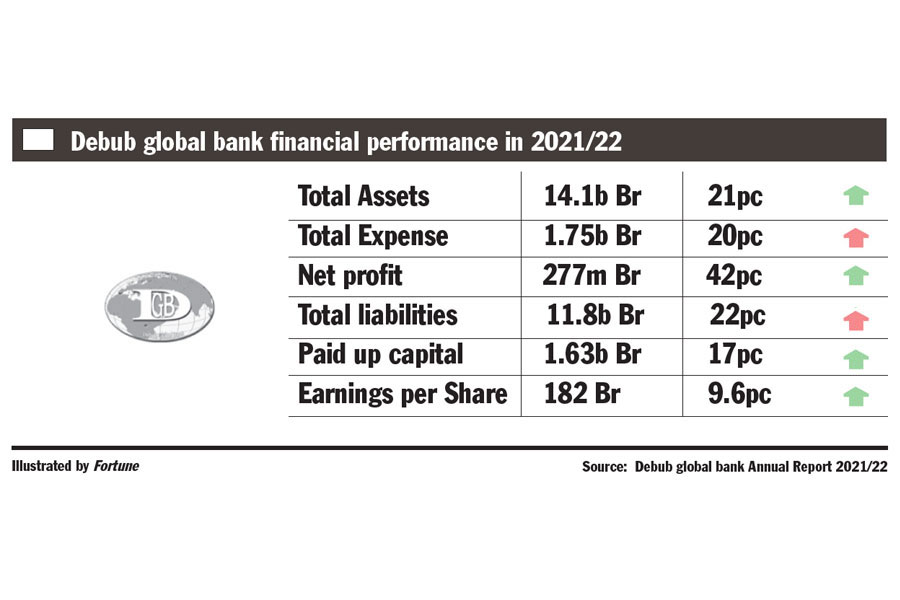
Fortune News | Apr 28,2024
Enat Bank has not only held its ground but has also surged ahead, marking a notable achievement in its performance over the 2022/23 operating year. In an industry where competition is fierce, and every point of growth is fought for, its profit of 543 million Br was remarkable, posting a 73pc growth.
The leap positioned the Bank ahead of its peers, including Addis International Bank, which reported a profit of 223 million Br, and Berhan Bank, with a gain that fell short by nearly 35 million Birr. The Bank's Earnings per Share (EPS) surged by 54 Br to 239 Br; while falling short of Global's impressive 292 Br, it stood out significantly higher than Addis Bank's 129 Br and Berhan's 156 Br. Abdulmenan Mohammed (PhD), a financial analyst based in London, who still sees room for improvement to reach the industry average growth of 34pc, described the growth in EPS as impressive.
"Shareholders ought to have been delighted," he said.
Nonetheless, the 23.9pc EPS, significantly lagged behind the average, hinting at lower profitability per share. With a Return on Equity (RoE) of 12.8pc and a Return on Asset (ROA) of 1.9pc, the Bank trails the industry's average, where EPS reached a weighted average of 38.4pc for 15 private commercial banks, RoE at 19.8pc, and RoA at 2.4pc.
At the core of Enat Bank's financial upswing is a robust increase in financial and non-financial intermediation activities. These have catalysed a notable rise in profit after tax, driven by a 37.3pc increase in interest from loans, investments in treasury bills, and bonds, culminating at 2.3 billion Br. Service charges and commissions more than doubled to 961.1 million Br, demonstrating a diversified revenue stream, even as income from foreign exchange dealings saw a 14.4pc decline to 21.7 million Br.
The average income for 15 banks reflected a more robust financial performance, with total income averaging 7.3 billion Br and expenses at 5.3 billion Br, yielding a gross profit of a little over two billion Birr.
However, Enat Bank's income growth came alongside a significant uptick in operational costs, a trend common for the industry.
Interest expenses on savings jumped by 17pc to 1.37 billion Br. Wages and benefits saw an 88.4pc increase to 678.83 million Br, positioning the Bank's expenditure on wages below Berhan's 1.62 billion Br but above Addis International's 481.8 million Br and slightly below Global's 731 million Br. Other operating expenses also saw a 63.5pc increase to 405.9 million Br, while provisions for impairment of loans and other assets soared, marking a nearly tenfold increase from the previous year to 149.3 million Br.
"This is alarming," Abdulmenan cautioned.
Erimias Andarge, who has helmed Enat Bank since 2020, attributed the expense surge partly to the Bank's aggressive branch expansion strategy, which saw the opening of 46 new branches and hiring 577 staff members within the fiscal year.
As the higher provisions during the fiscal year revealed, Ermias defended the expansion as "necessary to lower risk and enhance capability."
Under Erimias's watch, Enat Bank's total assets grew by 32.5pc to 22.8 billion Br, surpassing Global and Addis International and presenting a formidable challenge to Berhan Bank's reign on this front. The Bank also reported a 33.5pc increase in loans and advances to 14.9 billion Br, signalling its executives' aggressive lending strategy amidst an industry-wide liquidity crunch. Erimias stressed the Bank's cautious approach to loan disbursement, aiming to navigate the challenging financial terrain without succumbing to financial strain.
"We weren't simply handing out loans," the President said.
Erimias, with an experience spanning over 25 years in the banking sector, including a tenure at the Bank of Abyssinia, has positioned Enat Bank as a noteworthy player in the face of industry-wide challenges, including inflation, competition, and liquidity constraints.
Enat Bank's total assets signify approximately 26.7pc of the average total assets held by the benchmarked 15 banks, showing its relative size in the industry. This disparity extends to profitability metrics, with Enat Bank's profit after tax representing merely 1.41pc of the combined profit after tax for the 15 banks.
Despite its smaller scale compared to the industry leaders, Enat Bank's operational efficiency and strategic positioning suggest a potential for significant impact within the banking industry. Its capital adequacy ratio stood at an impressive 20.2pc, higher than both Berhan and Global, reflecting a solid capital base that exceeded the operational requirements set by regulators.
Yet, the Bank faced limitations, particularly in improving its operational efficiency to match its growth. The need for a delicate balance to rein in inflation without triggering a recession has never been more critical, according to Board Chairwoman Frehiwot Worku.
"The Bank's strategy has been to maintain a prudent loan-to-deposit ratio," she said, addressing the general assembly held in Millenium Hall in December.
The liquidity level at Enat Bank increased in value and relative terms, with cash and bank balances witnessing a significant increase.
Abdulmenan applauded the management for maintaining a healthy liquidity level.
"They should continue this approach," he said.
With a commendable increase in deposit mobilisation to 17.8 billion Br, the Bank witnessed diminished foreign currency reserves, heightened competition, and reduced liquidity with notable success. However, challenges such as the ongoing scramble for experienced staff and delayed loan repayments by contractors proved to be daunting operational hurdles the Bank continues to face.
Habtamu Mengitsu, a branch manager at Mexico Branch for the past eight years, is pleased with his branch's performance. He believes they have successfully come out on top of their peers.
Incorporated with 135.5 million Br paid-up capital raised from 7,972 shareholders, the 12-year-old Enat Bank's strategic expansion and operational adjustments, including a significant increase in paid-up capital by 31.6pc to 2.54 billion Br, reflect a commitment to sustainable growth and shareholder value. Enat Bank's equity base, comprising approximately 28,000 shareholders, including Mikeal Tesfaye, who has been a shareholder for eight years, saw the Bank's strong community ties and the trust it has cultivated among its shareholders.
The Bank's commitment to improving its service culture and operational procedures has not wavered, according to Mikeal. However, he called for increased loan disbursement and foreign currency provision to demonstrate its potential areas for growth to attract and retain customers.
"I wouldn't even look elsewhere if they were disbursing loans," he told Fortune.
When measured against the aggregated averages of 15 private commercial banks, Enat Bank remains a modest-sized bank. The average share capital among these banks stood at 4.5 billion Br, three times its size. The average for these banks has total equity and liabilities reaching 7.7 billion Br and 56.6 billion Br, respectively, and assets totalling 64.3 billion Br. Enat Bank's total equity was 3.5 billion Br and liabilities amounting to 19.2 billion Br, culminating in total assets valued at 22.7 billion Br.
Enat Bank's capital and equity proportions relative to the industry offer a silver lining. The Bank's capital and total equity command a substantial 42.4pc and 33.5pc, respectively, of the aggregate figures for the 15 banks. However, its financial strength contrasts sharply with its operational performance metrics, where its share of total income, profit after tax, and total comprehensive income significantly trails the averages at 1.97pc, 1.41pc, and 1.45pc, respectively.
While Enat Bank established a solid foundation in assets and equity, its executives' ability to translate the financial rebound into comparable income and profitability remains to be seen.
PUBLISHED ON
Mar 02,2024 [ VOL
24 , NO
1244]

Fortune News | Apr 28,2024

Radar | Sep 10,2022

Fortune News | Jul 13,2025

Commentaries | Jul 30,2022

Viewpoints | May 24,2025

Sunday with Eden | Jul 06,2019

View From Arada | Jul 07,2024

Radar | Jun 22,2024

Radar | Oct 11,2020

Fortune News | Apr 15,2023

Dec 22 , 2024 . By TIZITA SHEWAFERAW
Charged with transforming colossal state-owned enterprises into modern and competitiv...

Aug 18 , 2024 . By AKSAH ITALO
Although predictable Yonas Zerihun's job in the ride-hailing service is not immune to...

Jul 28 , 2024 . By TIZITA SHEWAFERAW
Unhabitual, perhaps too many, Samuel Gebreyohannes, 38, used to occasionally enjoy a couple of beers at breakfast. However, he recently swit...

Jul 13 , 2024 . By AKSAH ITALO
Investors who rely on tractors, trucks, and field vehicles for commuting, transporting commodities, and f...

Nov 1 , 2025
The National Bank of Ethiopia (NBE) issued a statement two weeks ago that appeared to...

Oct 25 , 2025
The regulatory machinery is on overdrive. In only two years, no fewer than 35 new pro...

Oct 18 , 2025
The political establishment, notably the ruling party and its top brass, has become p...

Oct 11 , 2025
Ladislas Farago, a roving Associated Press (AP) correspondent, arrived in Ethiopia in...